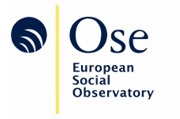The European Social Observatory is part of the four year NEUJOBS Project, funded by the European Commission (FP7). The main objective will be to highlight the opportunities and difficulties that result from the socio-economic and ecological transitions of the labour market. In order to include all stakeholders’ positions in the study, social partners will be actively involved. Results should allow decision makers to take the most appropriate social and economic measures and avoid/reduce negative impacts on some groups of workers (older workers, migrants, Roma, etc.).
Social inclusion
The European Social Observatory has been asked to draft, in collaboration with Ides Nicaise from the Higher Institute for Labour Studies (HIVA, KU Leuven), an assessment of the extent to which the measures proposed in the Belgian National Reform Programmes (NRP) are ensuring progress towards the Europe 2020’s social inclusion objectives and target.
The OSE has been closely involved in the scientific preparation of the 4th European Roma Platform which took place on 13 December 2010, in the framework of the Belgian Presidency of the EU. At the request of the Belgian Secretary of State for Social Integration and Combatting Poverty (Philippe Courard), Romana Careja and Bart Vanhercke, together with several experts from UNICEF, drafted a Discussion Paper on “Preventing Social Exclusion through Europe 2020: Early Childhood Development and the Inclusion of Roma Families”.
The Public Policy and Management Institute (PPMI) and the European Social Observatory (OSE) wrapped up the European Commission-funded assessment of the PROGRESS Peer Reviews in Social Protection and Social Inclusion.
The Public Policy and Management Institute (PPMI) and the European Social Observatory (OSE) wrapped up the European Commission-funded assessment of the PROGRESS Peer Reviews in Social Protection and Social Inclusion.
Ramon Peña-Casas and Dalila Ghailani have been asked to draft, in collaboration with Ides Nicaise from the Higher Institute for Labour Studies (HIVA, KU Leuven ), the Belgian report on “Promoting Social Inclusion of Roma”. This research, part of the EU Network of Independent Experts on Social Inclusion, contributes to following up the 2011 Communication on an EU framework for National Roma Integration Strategies.
OSE researchers involved in this project: Dalila Ghailani
The European Social Observatory (OSE) coordinates a new research on the social dimension of the Lisbon Strategy. In order to prepare for the Belgian Presidency of the EUin 2010, the Belgian Social Affairs Cabinet asked the OSE and the Center for Sociological research (CeSO) of the KULeuven to focus on two questions. First, to what extent did the Lisbon Strategy succeed in ‘balancing’ the three objectives of job creation, growth and social progress?
The European Social Observatory (OSE) coordinates a new research on the social dimension of the Lisbon Strategy. In order to prepare for the Belgian Presidency of the EUin 2010, the Belgian Social Affairs Cabinet asked the OSE and the Center for Sociological research (CeSO) of the KULeuven to focus on two questions. First, to what extent did the Lisbon Strategy succeed in ‘balancing’ the three objectives of job creation, growth and social progress?
The European tools for social policy in Belgium (ETOS.be) research project, funded by the Belgian Federal Science Policy Office, brings together six Belgian, French and Dutch research teams, made up of political scientists, lawyers and sociologists.
and sociologists.
The final conference of the INVOTUNES research project will bring together researchers, EU and national policymakers, social partners and other stakeholders to discuss the present and future role of social partners in the Semester. There will be ample time to consider the project’s key findings and examine the eight case studies (BE, BG, DE, FI, HU, IT, PT and SE).
